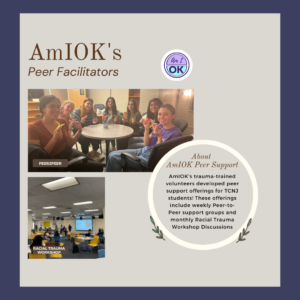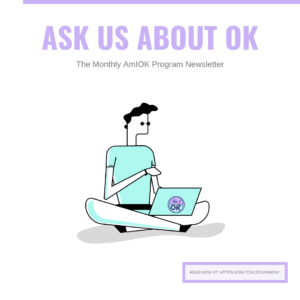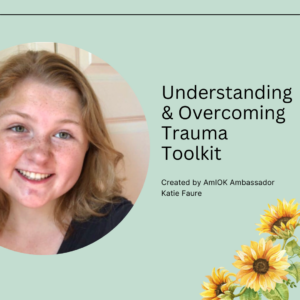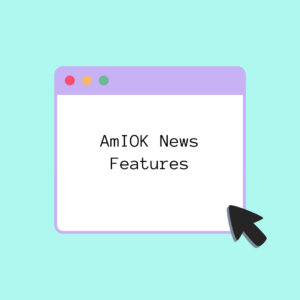AmIOK
If you are experiencing a medical or mental health emergency, please call 911 immediately.
AmIOK is a collaboration between the School of Nursing and Health Sciences and the Center for Integrative Wellness (CIW), in coordination with the Office of Anti-Violence Initiatives.
24 hour hotline number:
- 609-270-4524
- General Questions and Additional Programming:
Email us at amiok@tcnj.edu
Servicing the greater Mercer County area The AmIOk program provides timely support to enrolled college students who have experienced a crime or traumatic event through the use of a 24-hour confidential hotline. Program services include a comprehensive approach to whole person healing including medical, counseling, and other individualized services that are available to students and their loved ones. All programming is confidential and at the discretion of the client. Additionally, AmIOK is committed to providing community education and training on trauma and a Trauma-Informed approach for students, faculty, and staff.
AmIOK also offers unique opportunities for student volunteers and internships. Please click here to see our brochure.
Regular Office Hours:
AmIOK can be reached via email at amiok@tcnj.edu or by phone at 609-771-2164. For urgent matters you may call the hotline to speak to someone right away at 609-270-4524. AmIOK offers remote and in person services.
Crisis Response Hours:
24 hours a day by appointment only.
Upcoming Events:
Click on the images below to learn all about our upcoming events!
Meet AmIOK’s Peer Support Facilitators:
AmIOK offers peer support, ranging from weekly Peer-to-Peer (Peer2Peer) support groups to monthly Racial Trauma Workshop Discussions. Click on the image below to learn all about our trauma-trained volunteers who are leading the way to creating a trauma-informed campus community!
Ask Us About OK: The Monthly AmIOK Program Newsletter | November 2022, Issue 18
Volunteer Work Feature:
See how our volunteers are making a difference in the community!
AmIOK News Features: Check out the links below to see AmIOK in the News!
Digital Journal: Leading NJ Health School Announces Initiative for Nation’s First Trauma-Informed Campus With $1 Million VOCA Grant
Boston Herald: Campus Gets Real: Leading NJ Health School Students Volunteer with $1 Million Program to Help Peers Confront COVID-19 Trauma
The Signal, TCNJ: AmIOK presents second racial trauma survivors workshop of semester
The Signal, TCNJ: AmIOk hosts “Healing People, Heal People” forum to combat stress, anxiety and trauma
AmIOK Services
- Medical assessment and referral
- Assistance with understanding all support and reporting options available
- Post-medical follow up
- Individual and group counseling for the student and loved ones
- Transportation and accompaniment to the local emergency room
- Peer2Peer support groups and racial trauma workshops
- Available to respond and help with traumatic crisis events on campus
Types of Trainings Offered
A critical part of AmIOK’s mission involves increasing awareness on trauma and Trauma- Informed Care. We offer training and education in the following areas:
- AmIOK Program Overview & Resources
- Trauma Basics & Trauma Informed Approach
- Supporting Survivors Skills
*Each of these topics are 30 minute modules.
Additionally, AmIOK can offer presentations customized in content and length to the interests, and needs of your program. While working remotely, all presentations are conducted virtually over Zoom with an emphasis on being as interactive and engaging as possible. AmIOK also works collaboratively with AVI and there presentation information can be found here: Request Form.
Student Advisory Board Member
Open to all students, whether a current volunteer or not. They attend a one hour meeting once per semester. During these meetings, students can express their feedback about the AmIOK program and offer suggestions on how the AmIOK team can better serve the TCNJ population.
Campus Connector
Participating in the AmIOK Program as a Campus Connector is the least amount of time commitment while still providing valuable input and feedback to help shape the program and make a difference in the lives of students. Campus Connectors assist with small scale program events and social media educational content. Campus Connectors are not required to receive the AmIOK Trauma Training. Time commitment is 1-2 hours every few weeks. It is recommended that if you are an AmIOK Campus Connector that you attend the student advisory board meetings.
AmIOK Ambassador
Participating as an AmIOK Ambassador recruits passionate students who want to be a voice for change on campus. AmIOK Ambassadors will participate in developing and running events (in-Person and virtually), social media marketing, spreading the word about the AmIOK program throughout campus, and engaging other students to join as volunteers. AmIOK Ambassadors receive “The AmIOK Program at TCNJ’s level 1 Introductory Training*” in Trauma and Trauma Informed care. They gain awareness of the impact of Trauma, and acquired basic skills in utilizing a Trauma Informed Approach. It is recommended that if you are an AmIOK Ambassador that you attend the student advisory board meetings.
Companion
Participation as an AmIOK Companion requires more advanced training and participation than the other roles as this position works directly with survivors. As a Companion, you will be asked to assist a program participant, which is someone who was the recent victim of a crime, power-based personal violence, or sexual assault, etc., by accompanying them while they are transported to the hospital and/or throughout campus and ensuring they arrive to their destination safely. One semester working as an AmIOK Ambassador is required before being eligible to attend the additional training necessary for this role. Companions receive “The AmIOK Program at TCNJ’s level 2 Introductory Training*” in Trauma and Trauma Informed Care. In this role, they gain an increased awareness of the impact of Trauma and acquired basic skills in utilizing a Trauma-Informed Approach in working with survivors. Time commitment is 2-4 hours per week or more, plus being available and flexible to respond to hotline calls.
All positions are important and necessary in shaping the campus community to be a more trauma-informed, safe place for all.
*This training is not equivalent to a certified trauma professional training










